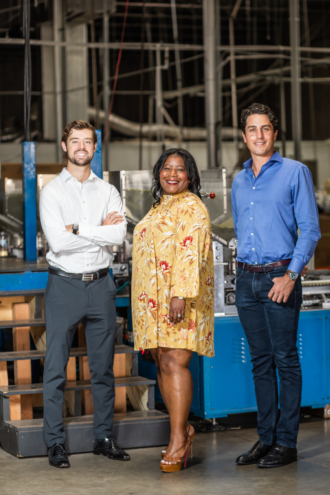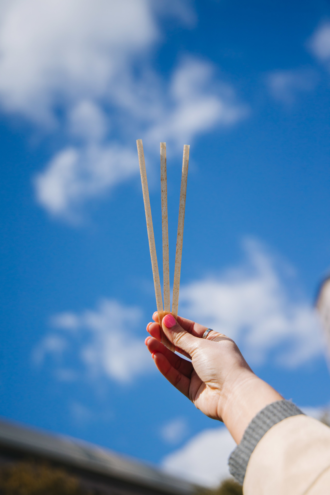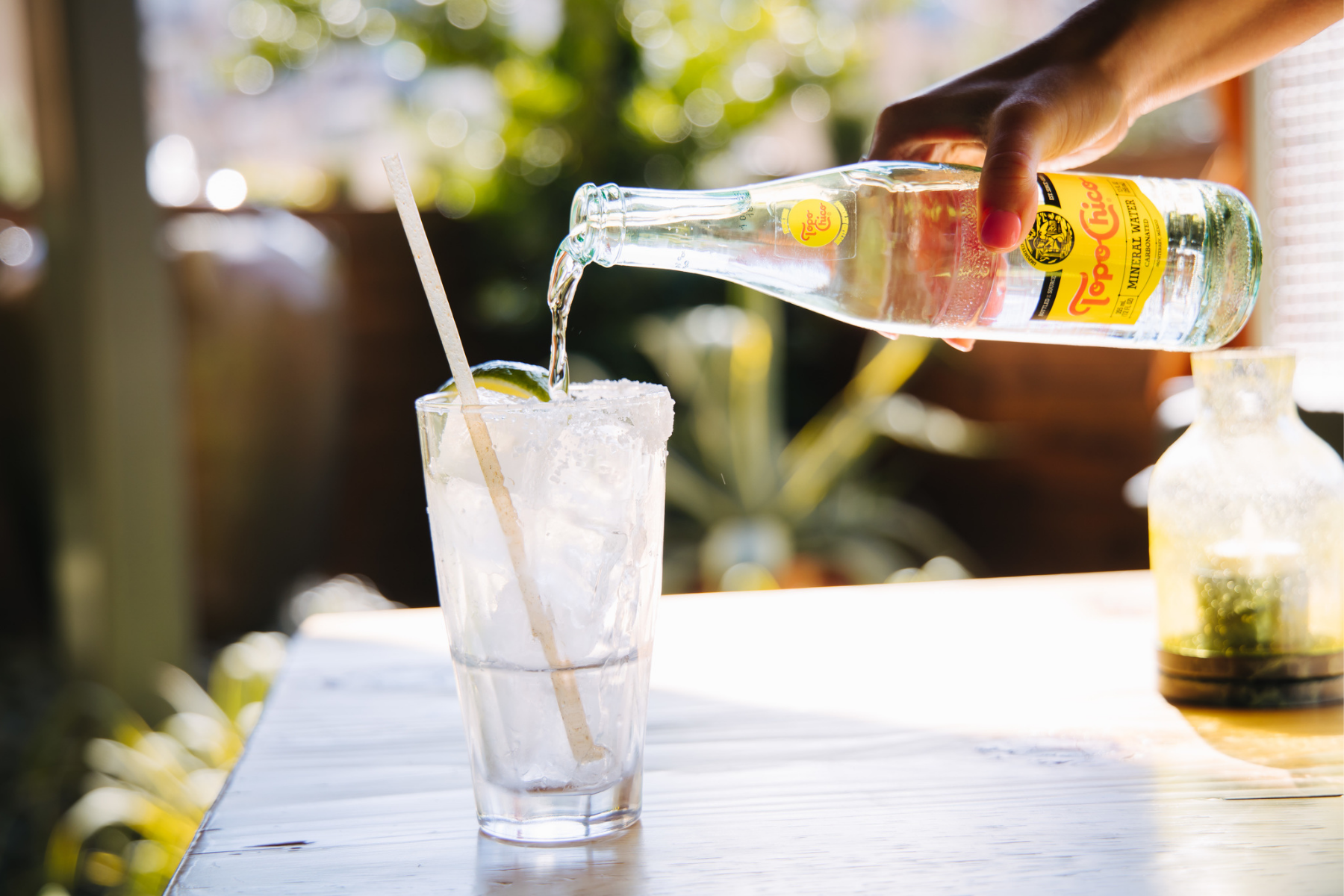A frosty glass of water had a time bomb protruding from its rim: a paper straw. It did its job at first, but it only took a few sips for it to wither and disintegrate. And Sharina Perry wasn’t having that.
The former internet and cable executive had, in 2018, founded a wellness company where she used plants, like hemp, in topical and oral applications. Now here she was in an Oklahoma pub, thinking about how her plant knowledge could help her develop a new straw, one that wouldn’t melt in liquid and still cut down on waste.
Perry invented a sturdy plant-based resin, an alternative to plastic, that can literally hold its own. Two years after that paper straw dissolved in her glass, the Dallas-based company PlantSwitch, in partnership with Perry’s Utopia Plastix, is using her invention to distribute an array of compostable food packaging to restaurants in North Texas and beyond. It very well may transform the field of compostable goods.
Dillon Baxter and Maxime Blandin, two Southern Methodist University graduates and former golf teammates, have traveled to golf courses all over the world. They likewise noticed the trend of paper straws in their drinks. And, like Perry, they hated it.
“Obviously we were happy that they weren’t using plastic,” says Baxter, but they wondered why there wasn’t something better than a flimsy paper straw. Like countless self-starters before them, they resolved to find something better. Last January they co-founded PlantSwitch to replace single-use plastics in the service industry, joining forces with Perry and her compostable innovation.
When Baxter and Blandin were originally on the hunt for a superior product, another manufacturer in sent them something quite similar to Perry’s brainchild. When she read about PlantSwitch in an article, she had a hunch: “When I saw it, I realized wherever they were getting their product from had my material.” She reached out to the guys. “I told them who I was and how broad our patent was,” she says. Perry suspected those samples had likely used her science.
“She’s the inventor of the resin, she’s the brains behind it,” says Baxter. “What she came up with is pretty revolutionary and we think it has the capacity to replace plastic in general.”

Now, Baxter and Blandin take Perry’s technology and distributes straws and utensils—soon bags and cups, too—to over 150 clients. Early adopters include Dallas-based Vandelay Hospitality Group; restaurateur Julian Barsotti of Fachini, Carbone’s, Sprezza, and Nonna; Brady Wood of Park House and José; Shannon Wynne’s restaurants like Rodeo Goat and the Meddlesome Moth; the new Thompson Hotel in downtown Dallas; and many others both local and nationwide. Outside clients include Pebble Beach Golf Resort in California; the guys got their wish, the product at a major golf club.
“The plan is to pretty rapidly scale up to eventually serve some of the largest chains in the country,” says Baxter.
Blandin, a native of Martinique Island in the French Caribbean, had long been wary of plastics having seen the damage it can do to small island nations. Baxter, who hails from the verifiably land-locked Hill Country town of New Braunfels, didn’t have to witness plastic pollution on an island to know the damage it does to the environment.
TAKEOUT AND DELIVERY HAS SKYROCKETED SINCE THE pandemic began. Last year, several food delivery apps doubled their business. Booze-delivery app Drzly saw sales spike 300 percent. Searches for “takeout” on the website increased ten-fold. And that’s just tracked data. Plenty of independent restaurants run online ordering independently while others hold tight to the call-and-pickup method. Carryout dining has helped legions of eateries survive these times. Still, that is a lot of trash.
Plastic pollution is projected to increase by 40 percent in the next decade, according to a report by the World Wildlife Fund. That makes achieving zero waste goals much trickier. Compostable kitchen and yard waste account for about 30 percent of what’s sent off to the city’s landfill. Single-use plastics are targeted in the city’s new Comprehensive Climate Action Plan. In its effort to divert 35 percent and 45 percent in 2030 and 2040, respectively, the plan reads that “refusing and reducing mean saying no to disposables, avoiding single use plastics and packaging, and saying no to participating in unsustainable practices.”
By comparison, Houston and Fort Worth had an estimated diversion rate of 21 percent in 2016, with Austin at 42 percent.
Environmentalists hope single-use plastics—like cutlery and cups, or bags that easily catch on tree branches—aren’t long for this world. But it will likely take the push of private industry to make changes.
“Legislation is already moving in that direction,” says Baxter, who notes the U.S. is years behind Europe on sustainability practices. Texas is even further behind. In 2018, the Texas Supreme Court struck down a bag ban in Laredo after finding it ran afoul of a state law that prohibited cities banning food containers. The next year, the Legislature refused to revisit it. “Europe is every single year pushing out more and more stringent biodegradability-compostability laws that limit the use of single-use plastic.”
The European Union is set to ban throw-away utensils, stirrers, and its ilk this year. In America, too, cities such as Boston, Boulder, New York, Los Angeles, Seattle, and San Francisco have bans or restrictions on plastic bags. Baxter and Blandin think it’s only a matter time that more places adopt similar laws.
Until that happens, though, corporate do-gooders and consumer will are behind ecological choices. “Granted, yes, any sustainable product is going to have a higher cost than petroleum-based products. Petroleum is pretty cheap. It’s hard to beat that,” concedes Baxter, but he adds “studies have shown customers prefer to visit companies that make sustainable choices.”
There is of course an entire compostable package industry swelling with eco-friendly options (however green-washed and loosely defined “friendly” is). The most prolific of which is a resin known as polylactic acid (PLA) that make up a lot of compostable plastics.
Much of what “you’re going to find on the market need to be commercially composted” in order to break down the material, says Baxter. “That in itself is using energy.” Without a facility to compost them, PLA-based products can take just as long as regular plastic to decompose in a landfill: about 450 years.
PlantSwitch products naturally biodegrade in 180 days. While PLA is an improvement on conventional plastics, it still sucks up precious energy. The crop Perry uses absorbs four to five times more carbon than trees. PlantSwitch avoids creating environmental problems as it seeks to solve another.

EVER SINCE SHE WAS A LITTLE GIRL SHARINA PERRY dreamed in solutions. “As a young girl, I would write out solutions—called a utopia.”
Perry’s family has roots in Texas. Her grandparents moved from here to New Mexico, where Perry was born. “My grandfather couldn’t read so when I was like seven or eight he would always have me read his documents.”
He owned land in New Mexico and a recycling business. “The scrap metal trade business, but we called it junking.” Her father worked in oil and gas for Texaco. Even then, a breadcrumb trail was routing Perry to her eventual work in composting—a form of recycling and an answer to petroleum. It seems preordained, in a way, but it wasn’t a straight-forward journey.
Perry studied English and political science. She had a full career in cable and internet as a government contractor. She didn’t begin researching different plant material and its potential uses until it was a necessity.
A few years ago, her nephew, then 19 years old, was diagnosed with neurofibromatosis. The condition causes tumors to form throughout the body, particularly in the brain, spinal cord, and nerves. “He was this vibrant young boy, but [neurofibromatosis] changed the quality of his life,” says Perry. There is no cure and it can last a lifetime.
“My sister came to me [when] he was having surgery in Dallas and she said, ‘You have to find something to help him.’” Perry dove into plants, creating natural products that eased inflammation. This led to the wellness arm of her growing company, Utopia.
When her paper straw died a soggy death in her cup of water, Perry aimed that same problem-solving self-assuredness at a new target.
“I have no degree in chemistry,” she said. “I made my first prototype of a paper straw in my kitchen just believing I could use plant material to do it.”
She began testing a hemp straw in the fall of 2018. She quickly moved from her kitchen sink tests to working with manufacturer Hoffmaster to commercially produce straws using her science. After a year of tweaking and testing, she had a plant resin for her straw. By last February, she had a stable product ready to go to market.
Perry’s patent attorneys were impressed. “They were like, ‘You put the big boys to shame with this one,’” she says.
When she was a child writing out solutions—utopias, she called them—“I told my parents I was going to change the world by the time I was 50,” Perry says. “I’m 47 now.”
WITH GROWING FREQUENCY, TO-GO CONTAINERS and plastic-wrapped plastic forks are a part of the way we eat. Takeout and delivery were rising before COVID. Add to that curbside offerings, the growth of ghost kitchens, and fast-casual restaurants superseding fine dining. The way we eat is changing. The very vessels carrying our meals could too, if PlantSwitch has any say about it.
When you think about composting, “your brain doesn’t naturally go to the demographic of Dallas, Texas,” says Baxter. “That’s not a knock on Dallas,” he assures, but the city’s warm reception is “one of the things that has surprised us.” Maybe progress is happening after all.
It’s okay to be skeptical about more consumerism as the ultimate answer to tackling waste or big bad climate change. A greener straw or a cup that will biodegrade if tossed into your backyard probably won’t save the planet. But it’s a start.
These three would say it could even be the plant-based straw that breaks the camel’s back into an environmental awakening.





